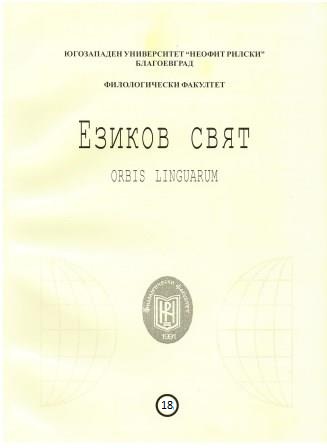REZEPTION DES FREMDEN –MIGRANTENLITERATUR ALS KULTURTRANSFER
RECEPTION OF THE FOREIGNNESS – MIGRANT LITERATURE AS CULTURAL TRANSFER
Author(s): Antoaneta Mihailova, Kalina Minkova Subject(s): Language and Literature Studies, Philology
Published by: ЮГОЗАПАДЕН УНИВЕРСИТЕТ »НЕОФИТ РИЛСКИ«
Keywords: migrant literature; cultural transfer; Bulgarian literary criticism
Summary/Abstract: The article reviews the distinction between emigrant, immigrant and migrant literature from the perspective of the contemporary Bulgarian literary criticism. The body of emigrant literature is regarded as comprising the works of nineteenthcentury Bulgarian authors (Rakovski, Karavelov, Vazov) who wrote in Bulgarian and intended their works for the Bulgarian readership. The works from the first half of the twentieth century, written in Bulgarian by Bulgarian authors living mostly in Germany and France, are perceived as part of the Bulgarian literature from this period on the grounds of their engaging with themes recognized as characteristically Bulgarian (Elisaveta Bagryana, Pencho Slaveykov, Kiril Hristov, Svetoslav Minkov etc.). The Bulgarian intellectuals who moved to Western Europe in three immigrant waves after 1944, however, wrote in the language of the country in which they settled. This is the reason why Bulgarian literary criticism did not acknowledge their works as part of Bulgarian literature. The authors this article deals with – Ilija Trojanov, Dimitre Dinev and Tzveta Sofronieva – do not deny their Bulgarian origins. They have chosen to write in German in order to be understood by readers in their new country. The German-speaking readership regards them as mediators between Bulgarian history, traditions and culture and the German, respectively Austrian, society precisely because they have rendered Bulgarians and the Bulgarian past in a language that is easy to understand. The interest in Bulgarian authors writing in languages other than Bulgarian in Western Europe peaked in the years immediately preceding and following Bulgaria’s accession to the European Union as the Western European citizens wanted to find out more about the new country in the Union. With their established reputation as eminent artists, these authors continue to cast a bridge between the two cultures. Their works keep being translated into many different languages and have won prestigious international awards
Journal: Езиков свят - Orbis Linguarum
- Issue Year: 18/2020
- Issue No: 2
- Page Range: 097-104
- Page Count: 8
- Language: German

